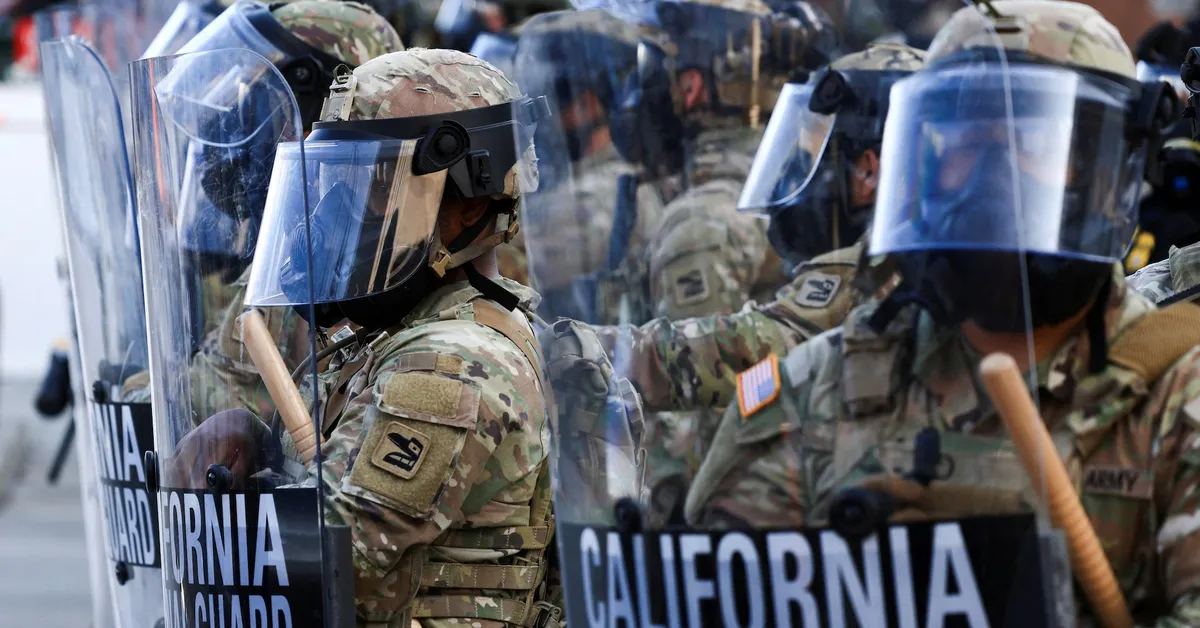
On September 2, 2023, a significant legal decision emerged from San Francisco, where a federal judge intervened to block U.S. President Donald Trump's administration from utilizing the military to combat crime in California. This ruling comes amid the Republican president's threats to deploy troops to additional U.S. cities, including Chicago.
U.S. District Judge Charles Breyer determined that the Trump administration's deployment of 4,000 National Guard members and 700 active-duty U.S. Marines to Los Angeles in June violated the Posse Comitatus Act. This important legislation restricts the use of federal troops for domestic law enforcement purposes. Judge Breyer's ruling constitutes a setback for Trump's efforts to broaden the military's role on American soil, a move that critics argue represents an alarming expansion of executive power that could heighten tensions between military forces and civilians.
While Judge Breyer has put the ruling on hold until September 12, 2023, it is expected that the Trump administration will appeal this decision. White House spokesperson Anna Kelly criticized Breyer, labeling him a "rogue judge," and asserted that the military deployment had effectively prevented chaos in Los Angeles. She emphasized that the president remains dedicated to safeguarding law-abiding citizens and indicated that this ruling would not mark the end of the controversy.
It is important to note that the injunction issued by Judge Breyer specifically pertains to military operations in California and does not extend nationwide. However, the judge referenced Trump’s expressed intention to send troops to Chicago and other urban areas as supportive evidence for his ruling. The president had claimed during an August 27 cabinet meeting that he possessed the authority to act as he deemed necessary if he believed the nation was in danger.
Trump has argued that the deployment of troops to Los Angeles was essential to ensure the safety of federal agents conducting immigration enforcement, particularly following large-scale protests triggered by extensive immigration raids. Judge Breyer acknowledged the necessity of federal personnel operating without fearing for their safety but cautioned against using this rationale to justify military deployments alongside federal agents, stating it undermines the very purpose of the Posse Comitatus Act.
The military presence in Los Angeles has faced widespread condemnation from Democratic leaders, who accuse Trump of leveraging military force to suppress dissent against his stringent immigration policies. California Governor Gavin Newsom, a vocal critic and one of the plaintiffs in this case, expressed gratitude for the accountability achieved against what he termed Trump’s "ILLEGAL militarization of an American city!" on social media platform X.
In addition to the situation in California, Trump has previously deployed the National Guard to Washington, D.C., where he has considerable authority, and has indicated a willingness to send troops to Chicago, the nation's third-largest city. The president has frequently cited rising crime rates as justification for federal troop deployments. Despite these claims, data shows that crime rates in both Washington and Chicago are currently on a declining trend.
During a three-day trial held last month, attorneys from the California Attorney General's office sought to demonstrate that the troops had engaged in law enforcement activities, such as establishing security perimeters and detaining individuals, and argued that their presence was unnecessary. They cautioned that a ruling favoring the Trump administration could lead to a sweeping and unprecedented change in the military's role within American society.
The Trump administration contended that the U.S. Constitution allows presidents to deploy troops to protect federal personnel and property as an exception to the Posse Comitatus Act. Their legal representatives maintained that the military's actions were solely aimed at safeguarding federal agents from perceived threats and operated within legal boundaries. As of the trial, several hundred soldiers remained in Los Angeles, primarily providing security during operations against marijuana farms and acting as a deterrent to protests at a park during immigration enforcement activities. Currently, approximately 300 National Guard troops are still stationed in Los Angeles, with plans to maintain their presence at least until November.
This ruling and the ongoing debate surrounding the use of military forces for domestic law enforcement raise critical questions about the balance of power and the role of the military in American society.